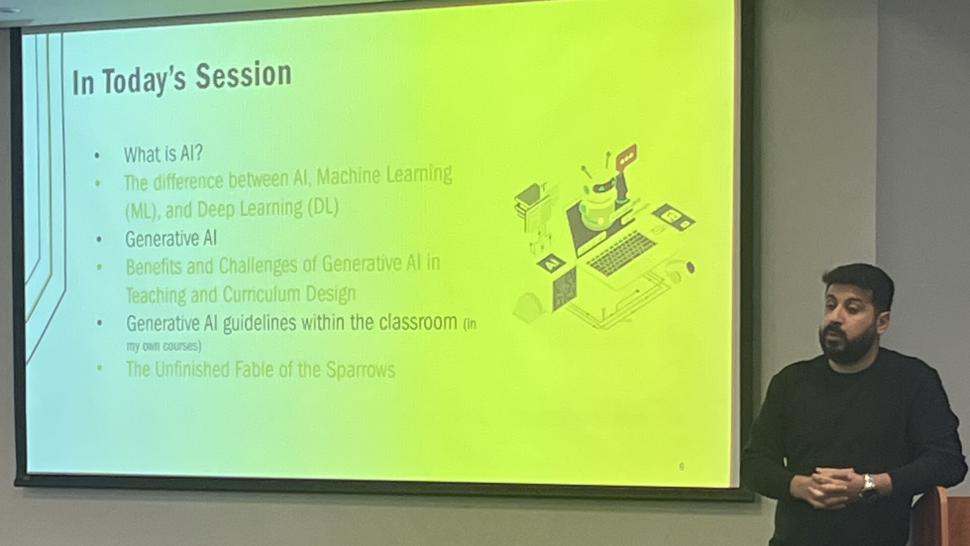
Artificial Intelligence (AI) is a rapidly evolving technology and one that’s use is becoming increasingly widespread – including in post-secondary education.
Maria-Lucia Di Placito and Jessica Freitag, both of whom are program coordinators and English professors at Humber, said it’s a topic of discussion in the Faculty of Liberal Arts & Sciences (FLAS). It’s why they invited Professor Ibrahim Tamim, who teaches Artificial Intelligence with Machine Learning at the College, to provide a presentation on the subject.
“AI is a big talking point these days,” said Di Placito. “We thought Professor Tamim would be a wonderful resource not just for our cluster but for the entire Faculty.”
Prior to the start of the term, a needs analysis survey was conducted that showed a significant number of Faculty members were interested in learning more about AI, particularly when it came to its incorporation, relevance, applicability, limitations and strengths within English-based and communication-based courses.
Di Placito noted that some instructors are embracing AI and instructing their students on how to use it ethically within the parameters of post-secondary. Others are a little hesitant to talk about it just yet, added Di Placito.
“Where so much of the questioning and the desire for more training and conversations have come from, especially in our department, is that it felt like it arrived very suddenly, especially when we talk about ChatGPT in particular,” said Freitag.
With the advance of AI and students' access to it, there was a need amongst the faculty to learn more about the technology and how it works. As Tamim noted during the presentation, AI is also being incorporated into industry and graduates will need to be prepared and ready to work with it.
Humber has released a statement on AI that states the College needs to set clear guidelines on how to use AI responsibly, ethically, and productively in academic settings, both to uphold the principles of academic integrity and to prepare learners for AI integration in their future careers.
The information session led by Tamim provided insights into the origin and technology behind AI, tracing its evolution and foundational concepts. Tamim also explored the applications of AI in college teaching and learning, emphasizing its value in building personalized learning content, helping with assessment creation, and much more.
Di Placito appreciated the historical context and information on AI's evolution that Tamim provided as well explaining the difference between AI and machine learning.
Tamim also provided demonstrations on the intuitiveness of AI. There was an app that had a person drawing an image and the AI could determine what the subject was within a few strokes.
The plan is to invite Tamim back for a second session that will have a greater focus on its impact on teaching and learning.
Both Di Placito and Freitag said Tamim coming and speaking to their group was an excellent example of interfaculty collaboration and learning and showed that Humber has an impressive group of professors and instructors who are knowledgeable in a wide variety of subjects that they were able to tap into for the benefit of their department.